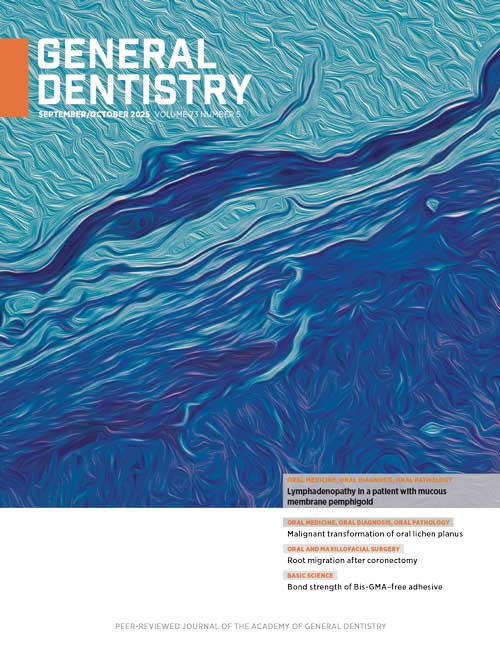-
Oral Medicine, Oral Diagnosis, Oral Pathology
What every dentist needs to know about cannabis use and head and neck cancer
John K. Brooks
Muhammad Hamza
Maureen A. Fitzpatrick
Nasir Bashirelahi
The objective of this review is to examine the association between cannabis exposure and head and neck cancer (HNC), including a discussion of epidemiologic findings and molecular mechanisms. A recent cohort study established that individuals with cannabis-related disorder have a significantly increased risk for HNC. Dental healthcare providers should inform their patients that heavy cannabis use may be associated with an increased risk of HNC.
2025 September/October; 73(5):25-27.
Full Article (PDF)
-
SELF-INSTRUCTION
Periodontics
A comparative evaluation of serum and salivary levels of apelin in chronic periodontitis associated with obesity and type 2 diabetes mellitus
Jammula Surya Prasanna
Duddukuri Hema
This study assessed levels of the biomarker apelin in patients with obesity, type 2 diabetes mellitus, and chronic periodontitis (CP). Apelin levels in patients with CP were generally lower than levels in individuals without CP. Individuals with obesity or obesity and diabetes showed higher levels of serum apelin compared with healthy individuals. A significant negative correlation was observed between serum apelin and periodontal parameters in specific subgroups.
2025 September/October; 73(5):28-34.
Full Article (PDF)
Self-Instruction Exercise No. GD550
-
SELF-INSTRUCTION
Oral Medicine, Oral Diagnosis, Oral Pathology
Nonodontogenic cysts and pseudocysts of the oral cavity: a retrospective study of 218 cases
Saede Atarbashi-Moghadam
Nastaran Niknam
Seyed Sepehr Mirebeigi-Jamasbi
This retrospective cross-sectional study determined the frequencies of nonodontogenic cysts and pseudocysts among 7036 patients evaluated over a 20-year period. Nonodontogenic cysts were found in 0.5% of all referred patients, while pseudocysts were identified in 2.6%. Significant relationships were found between cyst type and patient sex, patient age, and oral location of the cyst.
2025 September/October; 73(5):36-40.
Full Article (PDF)
Self-Instruction Exercise No. GD551
-
Basic Science
Influence of a Bis-GMA–free universal adhesive system on enamel bond strength to ceramic brackets
Aline Júnia Oliveira
Victor Angelo Martins Montalli
Jurandir Antonio Barbosa
Roberta Tarkany Basting
This in vitro study evaluated the shear bond strengths and Adhesive Remnant Index scores of 2 types of ceramic orthodontic brackets bonded to enamel using adhesives with and without bis-GMA. No statistically significant differences in bond strength were observed among the adhesives, but the Bis-GMA–free system (containing 10-MDP) showed the highest adhesive retention for both bracket types.
2025 September/October; 73(5):42-47.
Full Article (PDF)
-
Oral Medicine, Oral Diagnosis, Oral Pathology
Multidisciplinary approach to diagnosis and management of lymphadenopathy in a patient with mucous membrane pemphigoid: a case report
Heba Turkstani
Eman Alamodi
Eric T. Stoopler
Mel Mupparapu
Temitope T. Omolehinwa
This report describes the case of a patient with mucous membrane pemphigoid of the skin who developed oral mucosal blisters and gingival bleeding. Incidental findings during the routine head and neck examination led to a diagnosis of mantle cell lymphoma, reinforcing the importance of thorough, routine head and neck examinations for patients with autoimmune blistering diseases.
2025 September/October; 73(5):48-53.
Full Article (PDF)
-
Oral and Maxillofacial Surgery
Root migration after coronectomy of impacted mandibular third molars: case reports
Gustavo Henrique de Souza Silva
Enzo Balestrero
Jéssica Lemos Gulinelli
Pâmela Leticia dos Santos
Coronectomy is recommended to reduce the risk of nerve complications when impacted third molars are located near the inferior alveolar nerve. Root migration is among the possible sequelae of this technique, but a report of 3 clinical cases of root migration after coronectomy demonstrates that the procedure is a safe, viable alternative to conventional extraction.
2025 September/October; 73(5):54-58.
Full Article (PDF)
-
Oral Medicine, Oral Diagnosis, Oral Pathology
Malignant transformation of oral lichen planus after 6 years: a case report
Patrícia Peres Iucif Pereira
Amanda Bandeira de Almeida
João Adolfo Costa Hanneman
Eduardo Pereira Guimarães
Henrique de Carvalho Petean
Daiana Moreira Mendes Rozendo
Alessandro Antônio Costa Pereira
This case report describes a possible occurrence of malignant transformation of oral lichen planus in a woman who was treated with a topical corticosteroid. Five years after treatment, after ceasing to attend follow-up examinations, she developed oral squamous cell carcinoma. Patients should be advised about the importance of follow-up examinations, as malignant transformation of oral lichen planus may occur.
2025 September/October; 73(5):59-63.
Full Article (PDF)
-
Special Patient Care
Oral health in relation to manifestations and severity of cystic fibrosis: a cross-sectional study
Ana Carolina Evangelista Colafêmina
Aline Cristina Gonçalves
Cecília Regina Frazatto
Camila Real Delegá Rodrigues
Antônio Fernando Ribeiro
José Dirceu Ribeiro
Márcio Ajudarte Lopes
This study assessed the prevalence of oral health conditions in 82 patients with cystic fibrosis. The most significant oral health problem was dental enamel defects, which affected nearly half the population. Gingivitis was also prevalent in this population, and patients with higher gingival index scores were more likely to develop exacerbation of pulmonary symptoms.
2025 September/October; 73(5):64-71.
Full Article (PDF)
-
Fixed Prosthodontics
Influence of beverage solutions on the microhardness and surface roughness of provisional fixed denture materials
Eduardo Comeron Pieralini
Renan Aparecido Fernandes
Henrico Badaoui Strazzi-Sahyon
Anelise Rodolfo Ferreira Pieralini
Paulo Henrique Dos Santos
Sabrina Pavan
This study assessed the effects of in vitro aging with different beverage solutions on the hardness and surface roughness of provisional fixed denture materials. Beverage solutions significantly influenced the mechanical properties of the materials, with Protemp 4 bis-acryl–based resin material demonstrating hardness and surface roughness values that were less affected by aging.
2025 September/October; 73(5):72-77.
Full Article (PDF)

